小学六年级英语毕业复习资料
PEP人教版小学六年级毕业班英语复习资料(三至六年级)
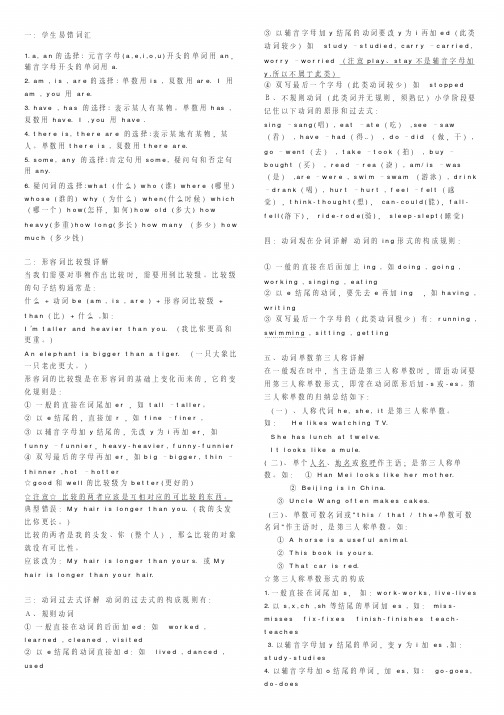
一:学生易错词汇1.a,a n的选择:元音字母(a,e,i,o,u)开头的单词用a n,辅音字母开头的单词用 a.2.a m,i s,a r e的选择:单数用i s,复数用ar e.I用a m,y o u用a r e.3.h a v e,h a s的选择:表示某人有某物。
单数用h as,复数用h a v e.I,y ou用h a v e .4.t h e r e i s,t h e r e a r e的选择:表示某地有某物,某人。
单数用t h e r e i s,复数用t h e r e a r e.5.s o m e,a n y的选择:肯定句用s o m e,疑问句和否定句用a n y.6.疑问词的选择:w h a t(什么)w h o(谁)w h e r e(哪里) w h o s e(谁的)w h y(为什么)w h e n(什么时候)w h i c h (哪一个)h o w(怎样,如何)h o w o l d(多大)h o wh e a v y(多重)h o w l o n g(多长)h o w m a n y(多少)h o w m u c h(多少钱)二:形容词比较级详解当我们需要对事物作出比较时,需要用到比较级。
比较级的句子结构通常是:什么+动词b e(a m,i s,a r e)+形容词比较级+t h a n(比)+什么,如:I’m t a l l e r a n d h e av i e r t h a n y o u.(我比你更高和更重。
)A n e l e p h an t i s b i g g e r t h a n a t i g e r.(一只大象比一只老虎更大。
)形容词的比较级是在形容词的基础上变化而来的,它的变化规则是:①一般的直接在词尾加e r,如t a l l–t a l l e r。
②以e结尾的,直接加r,如f i n e–f i n e r,③以辅音字母加y结尾的,先改y为i再加e r,如f u n n y–f u n n i e r,h e a v y-h e a v i e r,f u n n y-f u n n i e r④双写最后的字母再加e r,如b i g–b i g g e r,t h i n–t h i n n e r,h o t–h o t t e r☆g o o d和w e l l的比较级为b e t t e r(更好的)☆注意☆比较的两者应该是互相对应的可比较的东西。
2018-2019学年PEP人教版小学英语六年级英语全套毕业考试总复习资料

PEP人教版小学英语六年级英语全套毕业考试总复习资料六年级上册知识要点重点单词(会听,会说,会读,会写)122个:violin小提琴play the violin拉小提琴do eye exercises做眼保健操play sports参加体育活动learn学习learn English学英语have a rest休息一下take out the book取出书本matter要紧,重要afraid恐怕,害怕right now立刻,马上always总是,一直half半,一半past超过,超出brush刷,擦tooth牙齿usually通常,常常hour小时healthy健康的walk走,步行take a walk散步play ping-pong打乒乓球play tennis打网球boat船,划船go boating划船go skating滑冰go shopping购物a lot of许多how often多久一次twice两次once一次study学业,学习do well in在…做得好care for 关爱,照料earth地球pick采,摘pick flowers摘花cut down砍伐,把…砍倒dirty脏的make the air dirty污染空气waste浪费drive驾驶,开(车)drive a car开车more更多的have to 必须,不得不World Car Free Day世界无车日something某事,某物think想,认为also也,同样thing东西,事物only只,仅仅picnic野餐go on a picnic去野餐take out of 从…取出put 放put into放入,放进…里面get to抵达,到达meet at the gate在大门口会合free空闲的,自由的shall将要or还是,或者basket篮子ask问,询问hungry饥饿的start开始,起动answer回答,答复excited兴奋的,激动的just now刚才scarf围巾wallet钱包sunglasses太阳镜gloves手套warm jacket棉夹克rain boots雨靴school bag书包heavy大的,重的last最近的,最后的still 还,仍然in front of在…前面yesterday昨天lost丢失的,迷路的ago以前thousand千show表演,节目,展览watch a show看表演look after照顾,照看housework家务劳动do housework做家务see a friend看望朋友match比赛go away离开busy忙碌的work工作,事业hear听到,听说happen发生herself她自己beach沙滩,海滩volleyball排球play beach volleyball打沙滩排球museum博物馆visit the museum参观博物馆buy some gifts买一些礼物eat sea food吃海鲜make a cake做蛋糕myself我自己cousin堂(表)兄弟姐妹laugh笑,大笑cry哭joke笑话tell a joke讲笑话act演,扮演act a play演话剧guitar吉他play the guitar弹吉他win赢得,获得win a gift赢得礼物funny搞笑的,滑稽的everyone每个人everything每件事物,一切at the beginning开始,起初poor贫穷的,可怜的finally最后六年级下册知识要点重点单词(会听,会说,会读,会写)112个:speak to... 与…交谈mobile phone手机phone call电话make a phone call打电话Internet互联网go on the Internet上网send送,发送send a message发短信read an e-book读电子书e-mail电子邮件send an e-mail发电子邮件out 外面的,在外的take a message留言think about考虑a bowl of一碗plate盘子a plate of一盘a glass of一玻璃杯a bottle of一瓶a cup of一茶杯a piece of一片,一块,一张anything 任何东西else别的,其他的take up拿起address地址,住址pupil小学生actor男演员singer歌手,歌唱家reporter记者scientist科学家police警方,警察police officer警官player运动员set up建立,建造a hope school一所希望学校past 过去的grassland草原age 年龄at the age of 在…岁时lose失去,失败difficult困难的meeting会议,聚会have a sports meeting举办一场运动会throwing投掷运动meter米race比赛100-meter race 100米赛跑long jump跳远high高,高的high jump跳高running race赛跑take part in参加,参与anyway无论如何guess猜测,猜想wish祝福,祝愿clever聪明的,机灵的outgoing开朗的,外向的shy害羞的,内向的kind和蔼的,温和的friendly友好的hard-working努力的serious严肃的,认真的lazy懒惰的,懒散的easy容易的,简单的understand理解,明白Ms. 女士teach教without 无,没有Mrs. 夫人smile微笑get变,变得sale 卖,拍卖notebook笔记本magazine杂志glue胶水story book故事书model plane飞机模型toy car玩具小汽车scissors剪刀sell卖,出售money钱before在…之前bring 带来and so on等等,诸如此类southeast东南north北方northwest西北northeast东北west西方east东方southwest西南south南方hope希望,期望somewhere某处,某地by 沿着,在…旁边the Bund外滩famous著名的,出名的town城镇,市镇dream梦想,愿望,梦tour guide导游travel around the world环游世界land到达,着陆go to college上大学join加入,参加the National Team国家队study研究come true实现,成真hard努力地from now on从现在开始one day有一天maybe可能,也许believe相信常用介词及短语:in在...里面on在...上面under在...下面to到,去with同,和,跟,用at在for为了,因为between A and B在A和B之间behind在...的后面near附近next to紧挨着,旁边opposite to在...对面in front of在...前面特殊疑问词:what什么where哪里when什么时候why为什么who谁which哪一个how多么how long多久,多长how far多远how often多久一次what about怎么样how about怎么样国名及城市(单词的第一个字母须大写):China 中国Japan 日本Canada 加拿大U.K. 英国U.S. 美国New York 纽约Tokyo 东京注意: 在国家和城市名称的单词前使用in,即in+国名/城市名六年级上册知识要点重点句型(会听,写,认):1. It’s time to play th e violin.该是拉小提琴的时候了。
(完整版)小学英语毕业总复习资料

小学英语毕业总复习资料有关的词汇人称(I,you…)、动物、交通工具、颜色、家庭成员、日常用品、身体部位、数词、衣服鞋袜、国名、形容词(描述外形特征的词)、动词(表示行为动作的词)、方位介词(前后上下……)主食(饭,面包,面条,蛋糕…)、水果、饮料、疑问词(wh-开头的词语)……话题关于姓名的对话、询问年龄、关于颜色、关于爱好、关于拥有(×××有……)、关于问好、打招呼、关于选择、指向(如:这是……?)、问数量、问来自哪里、问“你在做什么”、问价格、问能力(Can you…)、问出行方式、提出请求(如:May I have…?)、命令与禁止、问是谁、问是谁的、提建议(Let’s…)、问最喜欢的动物是什么以及书上的有关对话等等☆时态☆小学阶段一共学了四种时态,分别是:一般现在时,一般将来时,现在进行时,一般过去时。
句式there be、have got、祈使句和感叹句。
一、国际音标[p] [t] [d] [k] [ɡ] [f] [v] [ʃ] [tʃ] [s] [z] [ʒ] [dʒ] [tr] [dr] [ts] [dz] [θ] [ð] [h] [m] [n] [ŋ] [l] [r] [w] [j] [i:] [e] [æ] [ə:] [ə] [a:] [ʌ] [u:] [u] [ɔ:] [ɔ][ai] [ei] [ɔi] [iə] [ɛə] [uə] [au] [ əu]二、字母1、英语的26个字母中有5个元音字母和一个半元音字母。
2、元音字母:Aa、Ee、Ii、Oo、Uu。
半元音字母:Yy。
3、按照相同元音音素进行归类为:4、字母的大写1)英语中句子第一个词首字母要大写。
2)人名中姓和名的首字母要大写。
3)国家、城市、乡、镇等地名的首字母要大写。
4)民族的首字母要大写。
5)植物或称呼的首字母要大写。
6)专有名词的首字母要大写。
7)表示“我”的单词“I”永远大写。
小学六年级英语毕业复习资料【There-be-句型与have--has的区
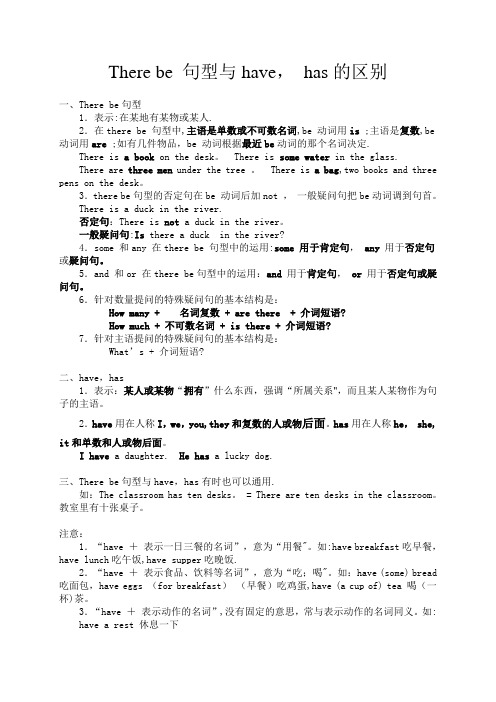
There be 句型与have,has的区别一、There be句型1.表示:在某地有某物或某人.2.在there be 句型中,主语是单数或不可数名词,be 动词用is ;主语是复数,be 动词用are ;如有几件物品,be 动词根据最近be动词的那个名词决定.There is a book on the desk。
There is some water in the glass.There are three men under the tree 。
There is a bag,two books and three pens on the desk。
3.there be句型的否定句在be 动词后加not ,一般疑问句把be动词调到句首。
There is a duck in the river.否定句:There is not a duck in the river。
一般疑问句:Is there a duck in the river?4.some 和any 在there be 句型中的运用:some 用于肯定句, any用于否定句或疑问句。
5.and 和or 在there be句型中的运用:and用于肯定句,or用于否定句或疑问句。
6.针对数量提问的特殊疑问句的基本结构是:How many + 名词复数 + are there + 介词短语?How much + 不可数名词 + is there + 介词短语?7.针对主语提问的特殊疑问句的基本结构是:What’s + 介词短语?二、have,has1.表示:某人或某物“拥有”什么东西,强调“所属关系",而且某人某物作为句子的主语。
2.have用在人称I,we,you,they和复数的人或物后面。
has用在人称he, she,it和单数和人或物后面。
I have a daughter. He has a lucky dog.三、There be句型与have,has有时也可以通用.如:The classroom has ten desks。
(人教pep版)小学六年级英语毕业考试:总复习全套资料(10页)【精品】

小学英语六年级总复习资料英语组2018年3月一.反义词big(大的)--- small(小的)blac(黑色)---white(白色)free(闲的)---busy(忙的)hot(热)---cold(冷)same(相同的)---different(不同的)cool(凉爽)---warm(暖和)tall(高的)---short(矮的)long(长的)---short(短的)young(年轻的)---old(老的)here(这里)---there(那里)before(之前)---after(之后)new(新的)---old(旧的)二.单词归类1.国家(country)C hina中国A merica美国A ustralia澳大利亚J apan日本E ngland英国C anada加拿大F rance法国2.国籍(nationality)C hinese中国人A merican美国人A ustralian澳大利亚人J apanese日本人E nglish英国人C anadian加拿大F rench 法国人3.语言(language)Chinese汉语Japanese日语English英语French 法语4.科目(subject)Chinese语文maths 数学English 英语art 美术music音乐P.E. 体育history 历史science科学5.星期(wee)Sunday星期日Monday星期一Tuesday星期二Wednesday星期三Thursday星期四Friday星期五Saturday星期六6.季节(season)spring 春天summer夏天autumn秋天winter冬天7.月份(month)January一月February 二月March三月April四月May五月June 六月July 七月August 八月September 九月October 十月November十一月December十二月8.节日(festival)Spring Festival 春节Dragon Boat Festival龙舟节Mid-autumn Festival中秋节New Year’s Day元旦National Day 国庆节Children’s Day儿童节Easter复活节Halloween万圣节Christmas 圣诞节Women’s Day妇女节Teacher’s Day 教师节May Day劳动节9.患病(illness):have a fever发烧hurt疼痛have a cold感冒have a toothache牙疼have a headache头疼have a sore throat喉咙疼10.食物(foods)cae蛋糕mooncae月饼dumpling 饺子bread 面包por猪肉fish鱼肉chicen 鸡肉meat肉egg鸡蛋sandwich三文治pia 比萨饼hamburger 汉堡包noodles 面条11.时间(time)year年month 月wee周date日期day 白天hour 小时morning早上afternoon下午evening晚上yesterday昨天today今天tomorrow明天last year去年12.服装(clothes)T-shirt T恤衫sweater毛衣coat 大衣shorts短裤jeans牛仔裤hat帽子cap帽子shoe鞋子soc 短袜13.动物(animals)chicen鸡duc鸭goose鹅dog狗cat 猫pig猪sheep绵羊goat 山羊horse 马lion狮子tiger老虎elephant 大象snae蛇angaroo 袋鼠money 猴子bear 熊panda熊猫whale鲸frog青蛙mouse老鼠giraffe长颈鹿deer鹿14.颜色(colour)grey 灰色red红色green绿色yellow黄色blue蓝色white白色blac黑色pin粉红色orange橙色brown褐色purple紫色15.饮料(drins)juice汁mil 牛奶coe可乐tea茶coffee 咖啡soup 汤16.数字基数词:one 一two 二three三four四five五si 六seven七eight八nine 九ten 十eleven 十一twelve 十二thirteen 十三fifteen十五twenty二十thirty 三十forty 四十fifty五十hundred 百thousand 千million百万序数词:first 第一second第二third第三fifth第五sith第六seventh第七eighth第八ninth第九twelfth 第十二twentieth 第二十thirtieth第三十17.植物、水果tree 树flower花seed种子grass草vegetable蔬菜tomato西红柿potato马铃薯fruit 水果apple苹果pear 梨orange橙banana 香蕉grape葡萄peach桃子18.职业(jobs)worer工人farmer农民soldier士兵doctor医生nurse护士teacher 教师driver司机coo厨师policeman警察19、自然界sun太阳moon月亮star星星sy天空river江河lae 湖sea大海hill山mountain山脉snow雪wind风cloud云rain雨20、天气(weather)sunny阳光明媚的windy有风的cloudy多云的snowy下雪的rainy下雨的dry干燥的wet湿的warm暖的cool凉爽的cold冷的hot热的21、人体部分head头hair头发hand手face脸eye眼ear耳朵nose鼻子leg腿foot脚22、人people人们man男人woman妇女child小孩grandparent祖父母parent父母father父亲mother母亲sister姐妹brother兄弟cousin堂兄uncle舅舅、叔叔23、文具pen钢笔pencil铅笔rubber橡皮ruler尺nife小刀map地图dictionary字典24、建筑与房屋部分bedroom卧室living-room客厅itchen厨房garden花园office办公室ban银行school学校hospital医院cinema电影院par公园par动物园shop商店boostore书店post office邮局TV station电视台hotel宾馆wall墙floor 地板window 窗door门25.日用品camera 照相机telephone电话cloc钟lamp灯fridge冰箱cup杯glass玻璃杯bo 盒子bowl碗26.方向left左right右east东south南west西north北27.家具bed床des书桌table桌子chair椅子shelf架子28.餐食meal一顿饭breafast早餐lunch 午餐dinner晚餐29.交通工具bus公共汽车train火车car小汽车bie自行ship轮船boat小船plane飞机30.外貌tall高的short矮的fat胖的healthy健康的good-looing 好看的beautiful美丽的strong强壮的old 老的young 年轻的heavy重的四.动词词组go shopping去购物go fishing去钓鱼go boating去划船go swimming 去游泳go siing 去滑雪go sating去溜冰go for a wal 去散步go to the cinema 去看电影go to bed去睡觉go to school去上学go to wor去上班go bac回go out出去play football 踢足球play basetball打篮球play table tennis打乒乓球play badminton 打羽毛球play the piano 弹钢琴play games玩游戏write a letter写信listen to music听音乐watch TV 看电视see a film 看电影tae photos照相clean the room打扫房间wash clothes洗衣服draw a picture画画have breafast 吃早餐have lunch 吃午餐have dinner 吃晚饭do housewor 做家务do my homewor做作业have a Chinese lesson 上语文课tae a message传递信息turn on打开tae eercise锻炼tae medicine服药tae photos照相plant trees种树pic up捡起wait for等候五.介词短语a pair of 一双 a lot of 许多on the farm在农场in front of在…前面in the sy 在空中loo for寻找put on穿上wait for等待wae up醒on foot步行in the morning 在早上in the afternoon在下午in the evening在晚上at night在晚上at school 在学校at home在家六、易错词汇1. a, an的选择元音字母开头的单词用an,辅音字母开头的单词用a.2. am , is , are的选择单数用is , 复数用are. I 用am , you 用are.3. have , has 的选择表示某人有某物。
小学英语六年级毕业考试总复习资料

小学英语六年级毕业考试总复习资料一、 26个字母:(要求会默写字母的大小写、连续听音书写字母、按顺序排列字母或单词)26个字母:Aa Bb Cc Dd Ee Ff Gg Hh Ii Jj Kk Ll Mm Nn Oo Pp Qq Rr Ss Tt Uu Vv Ww Xx Yy Zz元音字母:A a , Ee, Ii, Oo, Uu二、语音知识:Aa name名字 cake蛋糕 gate大门 cage鸟笼 snake蛇 face脸 baby娃娃apple苹果 cat猫 bag书包 hat帽子 fat胖的Ee(ee,ea) these 这些 three三 sheep绵羊 knee膝盖 tree树 beans豆角 egg蛋 elephant大象 desk课桌 bed 床 pen钢笔 leg 腿Ii five 五 nine九 like 喜欢 kite风筝 bike 自行车 fish鱼 big大的 six 小的 milk牛奶 is是 it 它 this 这个Oo(oa,oe) nose 鼻子 those那些 bone骨头 toe 脚趾头 goat山羊 boat 船 coat 大衣 dog 狗 fox狐狸 frog 青蛙 box盒子 hot 热的 not不是Uu you你,你们 use使用 computer计算机 blue 蓝色的 flute 笛子 June 六月bus 公共汽车 umbrella 雨伞 uncle 叔叔Cc CD 光盘 circle 圆形 cent 分钱cat 猫 camera 照相机Gg(ge)orange 桔子 giraffe 长颈鹿 page 页 frog 青蛙 girl 女孩 big 大的 gate 大门th thin 瘦的 three 三 thirteen 十三 mouth 嘴mother 妈妈 father 爸爸brother 兄弟 they 他们 this 这个 that 那个 feather 羽毛wh what 什么 when 什么时候 where 哪里 why 为什么 which 哪一个 white 白色的 water水 woman 女人 walk 走 who 谁 whose 谁的ar car 汽车 park 公园 farm 农场 arm手臂 star星星ir girl 女孩 bird 鸟 nurse护士 purse 钱包 turtle 海龟 third第三 hurt 疼ow cow奶牛 owl 猫头鹰 house 房子 mouse 鼠,鼠标 cloudy多云的oy oi boy 男孩 toy 玩具 oyster 贝壳 oil 油 coin 硬币 boil 沸腾or/oor horse 马 store 商店 corn 玉米 door 门 floor 地板air ear chair 椅子 hair 头发 pear 梨 bear 熊oo book 书 good 好的 look 看 foot 脚 moon 月亮 food 食物 pool 池子room房间字母s或es的发音:字母s在词首发音为/s/, 在中间如:usually, television, treasure, casual中发音为/ /;以/p/, /t/, /k/ 清音收尾,读音为/s/;其他情况一般读音为/z/;以s, x, ch, sh 收尾加es的,es读音为/iz/。
苏教版小学六年级英语毕业复习资料(全)
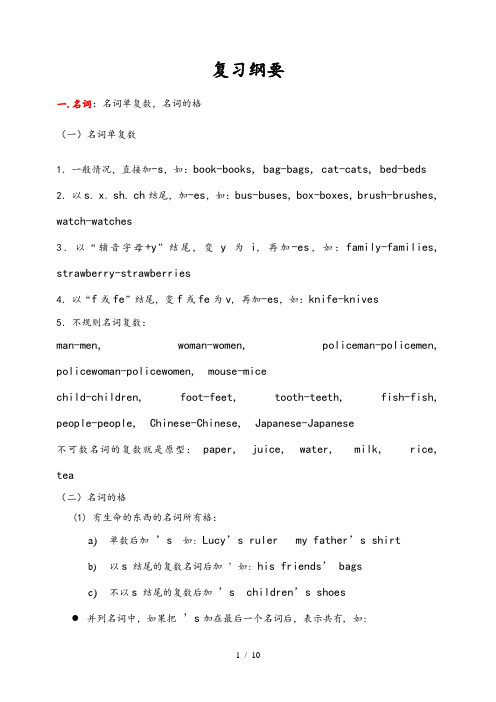
复习纲要一.名词:名词单复数,名词的格(一)名词单复数1.一般情况,直接加-s,如:book-books, bag-bags, cat-cats, bed-beds 2.以s. x. sh. ch结尾,加-es,如:bus-buses, box-boxes, brush-brushes, watch-watches3.以“辅音字母+y”结尾,变y为i, 再加-es,如:family-families, strawberry-strawberries4.以“f或fe”结尾,变f或fe为v, 再加-es,如:knife-knives5.不规则名词复数:man-men, woman-women, policeman-policemen, policewoman-policewomen, mouse-micechild-children, foot-feet, tooth-teeth, fish-fish, people-people, Chinese-Chinese, Japanese-Japanese不可数名词的复数就是原型: paper, juice, water, milk, rice, tea(二)名词的格(1) 有生命的东西的名词所有格:a)单数后加’s如: Lucy’s ruler my father’s shirtb)以s结尾的复数名词后加’如: his friends’ bagsc)不以s结尾的复数后加’s children’s shoes并列名词中,如果把’s加在最后一个名词后,表示共有, 如:Tom and Mike’s car汤姆和迈克共有的小汽车要表示所有物不是共有的,应分别在并列名词后加’sTom’s and Mike’s cars 汤姆和麦克各自的小汽车(2)表示无生命东西的名词通常用“ of+名词”来表示所有关系:如:Apictureoftheclassroom a map of China二.冠词:不定冠词,定冠词种类:(1)不定冠词:a / an a unit / an uncle元音开头的可数名词前用an :an egg / an apple / an orange / an eraser / an answer / an ID card / an alarm clock / an actor / an actress / an / an address / an event / an example / an opera / an old man / an interesting book / an exciting sport / an action movie / an art lesson /(2)定冠词:the the egg the plane2. 用法:定冠词的用法:(1)特指某(些)人或某(些)物:The ruler is on the desk.(2)复述上文提到的人或物:He has a sweater. The sweater is new. (3)谈话双方都知道的人或物:The boys aren’t at school.(4)在序数词前:John’s birthday is February the second.(5)用于固定词组中: in the morning / afternoon / evening不用冠词的情况:(1)专有名词前:China is a big country.(2)名词前有定语:this , that , my , your , some, any , no 等:This is my baseball.(3)复数名词表示一类人和事:Monkeys can’t swim. They are teachers.(4)在节日,日期,月份,季节前:Today is Christmas Day. It’s Sunday.(5)一日三餐前:We have breakfast at 6:30.(6)球类棋类运动前:They often play football after class. He plays chess at home.* 但乐器前要用定冠词:I play the guitar very well.(7)学科名称前:My favorite subject is music.(8)在称呼或头衔的名词前:This is Mr. Li.(9)固定词组中:at noon at night by bus三、代词:人称代词,物主代词四、形容词,副词:比较级,最高级(一)、形容词的比较级1、形容词比较级在句子中的运用:两个事物或人的比较用比较级,比较级后面一般带有单词than。
(1)小学六年级英语毕业复习资料【形容词、副词的比较级和最高级】

六年级英语毕业总复习(一)形容词、副词的比较级和最高级一、单词记忆趣味记单词draw 画画dance 跳舞rock 摇滚二、完全,缩略形式:I'm=I am he's=he is she's=she is they're=they are you're=you are there's=there isthey're=they are can't=can not don't=do not doesn't=does not isn't=is not aren't=are not let's=let us won't=will not I'll=I will wasn't=was not总结:通常情况下,'m即am,'s即is(但let's=let us), 're即are ,n't即not (但can't=can not) 三形容词(adj.)big大的small小的long长的tall高的short短的;矮的young年轻的old旧的;老的strong健壮的thin瘦的active积极活跃的quiet安静的nice好看的kind和蔼亲切的strict严格的smart聪明的funny滑稽可笑的tasty好吃的sweet甜的salty咸的sour酸的fresh新鲜的favourite最喜爱的clean干净的tired疲劳的excited兴奋的angry生气的happy高兴的bored无聊的sad忧愁的taller更高的shorter更矮的stronger更强壮的older年龄更大的younger更年轻的bigger更大的heavier更重的longer更长的thinner更瘦的smaller更小的三形容词、副词的比较级和最高级一般来说,中文意思是“……的”的词是形容词,而中文意思是“……地”的词是副词。
小学六年级英语毕业复习
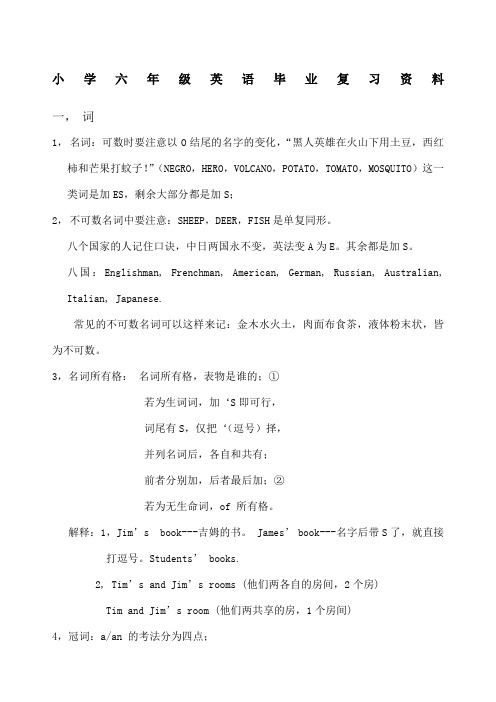
小学六年级英语毕业复习资料一,词1,名词:可数时要注意以O结尾的名字的变化,“黑人英雄在火山下用土豆,西红柿和芒果打蚊子!”(NEGRO,HERO,VOLCANO,POTATO,TOMATO,MOSQUITO)这一类词是加ES,剩余大部分都是加S;2,不可数名词中要注意:SHEEP,DEER,FISH是单复同形。
八个国家的人记住口诀,中日两国永不变,英法变A为E。
其余都是加S。
八国:Englishman, Frenchman, American, German, Russian, Australian, Italian, Japanese.常见的不可数名词可以这样来记:金木水火土,肉面布食茶,液体粉末状,皆为不可数。
3,名词所有格:名词所有格,表物是谁的;①若为生词词,加‘S即可行,词尾有S,仅把‘(逗号)择,并列名词后,各自和共有;前者分别加,后者最后加;②若为无生命词,of 所有格。
解释:1,Jim’s book---吉姆的书。
James’book---名字后带S了,就直接打逗号。
Students’ books.2, Tim’s and Jim’s rooms (他们两各自的房间,2个房)Tim and Jim’s room (他们两共享的房,1个房间)4,冠词:a/an 的考法分为四点;⑴:a, e ,I ,o 元音音素开头的要用AN。
⑵:u 分为发/∧/ 时, an umbrella, an ugly boy.发/ju:/ 时, a university, useful book.⑶an honest boy/ hour H不发音⑷F,H,L,M,N,S,X,R 单独拿出来问时,用AN。
如: There is an “H” in the word hair.There is an “L” in the word lake.The的用法:独旧双方极乐序,姓形山河惯党团。
零冠词的用法:(不用THE的情况)人名国名抽象名,复数泛指都加零,季月节假日餐球,语言学科运动车。
新PEP六年级英语总复习及练习精选全文完整版

可编辑修改精选全文完整版六年级英语毕业总复习一单词名词动词形容词可数不可数原型进行式过去式第三人称单数原型比较级apple water do doing did does fat fatter(将来时、一般现在时)(一般现在时)单数复数apple apples一、定义:名词可以分为可数名词和不可数名词,不可数名词没有单复数,一律看作单数。
二、可数名词:分为单数和复数⑴单数:以元音音标a e i o u 开头的单数用an(一个),其他用a(一个)或者one +单数复数:some(一些)加复数或者不可数名词;或者大于1的具体数字+复数⑵可数名词单数→复数的变化规则:三、不可数名词:以下词为常为不可数名词,他们的复数形式就是他们本身。
water 水milk牛奶tea 茶rice米饭juice 果汁bread面包meat 肉四、人称代词:be 动词am , is , are的选择: 单数用is , 复数用are,I 用am , you 用are.练习题一、选择a或an或some.pen bag apple big applebananas orange books water二、写出下列各词的复数.watch _______ child _______ day________ foot________ book_______ sheep ______ box_______ peach______ man______fish _______ paper_______三、选择:1、There on the wall .They are very beautiful.A. are photoesB. are photos2、That’s book.A. anB. a3、There some in the river.A. are, fishesB. are ,fish4. Would you like _______ ,please?A. some watersB. some water5、Do you want to drink much ?A、a milkB、milk四、选择be(am is are ) 填空。
小学六年级毕业考试英语复习资料汇总
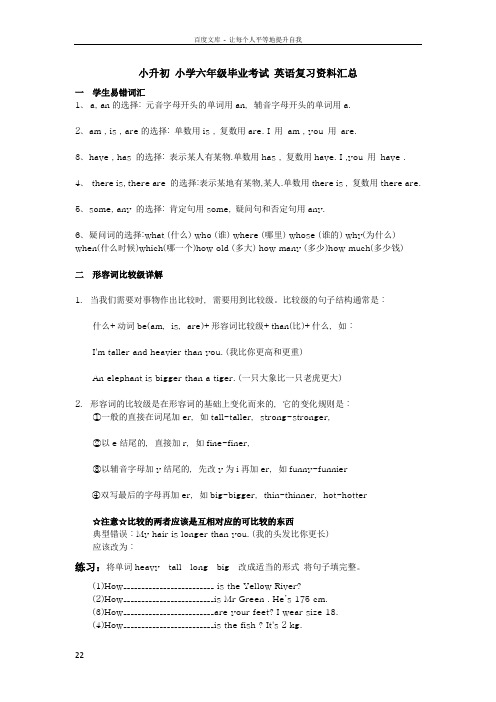
小升初小学六年级毕业考试英语复习资料汇总一学生易错词汇1、a, an的选择: 元音字母开头的单词用an,辅音字母开头的单词用a.2、am , is , are的选择: 单数用is , 复数用are. I 用am , you 用are.3、have , has 的选择: 表示某人有某物.单数用has , 复数用have. I ,you 用have .4、there is, there are 的选择:表示某地有某物,某人.单数用there is , 复数用there are.5、some, any 的选择: 肯定句用some, 疑问句和否定句用any.6、疑问词的选择:what (什么) who (谁) where (哪里) whose (谁的) why(为什么)when(什么时候)which(哪一个)how old (多大) how many (多少)how much(多少钱)二形容词比较级详解1.当我们需要对事物作出比较时,需要用到比较级。
比较级的句子结构通常是:什么+动词be(am,is,are)+形容词比较级+than(比)+什么,如:I'm taller and heavier than you. (我比你更高和更重)An elephant is bigger than a tiger. (一只大象比一只老虎更大)2.形容词的比较级是在形容词的基础上变化而来的,它的变化规则是:①一般的直接在词尾加er,如tall-taller,strong-stronger,②以e结尾的,直接加r,如fine-finer,③以辅音字母加y结尾的,先改y为i再加er,如funny-funnier④双写最后的字母再加er,如big-bigger,thin-thinner,hot-hotter☆注意☆比较的两者应该是互相对应的可比较的东西典型错误:My hair is longer than you. (我的头发比你更长)应该改为:练习:将单词heavy tall long big 改成适当的形式将句子填完整。
小学英语六年级毕业总复习资料

⼩学英语六年级毕业总复习资料:东榆⼩学2013——2016学年度六年级专项总复习专题⼀、词汇&⼀、学习⽤品pen钢笔pencil铅笔ruler尺⼦bag包book书eraser橡⽪crayon蜡笔sharpener卷笔⼑pencil-box铅笔盒school bag书包⼆、书籍newspaper报纸post card明信⽚magazine杂志comic book漫画书story-book故事书Chinese book语⽂书math book数学书notebook笔记本English book英语书dictionary词典⼆、⾝体部位;foot脚head头face脸hair头发nose⿐⼦mouth嘴eye眼睛ear⽿朵arm⼿臂hand⼿finger⼿指leg腿tail尾巴三、颜⾊red红blue蓝yellow黄green绿white⽩black⿊pink粉红purple紫orange橙brown棕四、动物(animals)、cat猫dog狗pig猪duck鸭cow奶⽜frog青蛙tadpole蝌蚪tortoise乌龟chicken⼩鸡rabbit兔horse马elephant⼤象ant蚂蚁fish鱼bird鸟snake蛇mouse⽼⿏bear熊lion狮⼦fox狐狸deer⿅panda熊猫hen母鸡cow奶⽜donkey驴lamb⼩⽺sheep绵⽺goat⼭⽺tiger⽼虎monkey猴zebra斑马giraffe长颈⿅rat⼩⽼⿏shark鲨鱼Caterpillar⽑⾍duckling⼩鸭⼦squirrel松⿏parrot鹦鹉butterfly蝴蝶Dragonfly 蜻蜓insect昆⾍swallow燕⼦bat蝙蝠⽕鸡Turkey五、⼈物|friend朋友people⼈物baby婴⼉kid⼩孩parents⽗母mother母亲father⽗亲mom妈妈dad爸爸grandparents祖⽗母grandma/grandmother(外)祖母grandpa/grandfather(外)祖⽗aunt姑姑uncle叔叔sister姐妹brother兄弟son⼉⼦daughter⼥⼉man男⼈woman⼥⼈boy男孩girl⼥孩Mr.先⽣Miss⼩姐Ms⼥⼠,夫⼈pen pal笔友student学⽣classmate同学⽔果类:!Apple苹果orange橙⼦lemon柠檬peach桃⼦梨⼦pear ⾹蕉banana 葡萄grape 芒果mango草莓strawberry 樱桃cherry 荔枝litchis 西⽠watermelon六、职业teacher教师student学⽣doctor医⽣nurse护⼠engineer⼯程师police警察cleaner清洁⼯worker⼯⼈driver司机farmer农民waiter服务员singer歌唱家writer作家actor男演员actress⼥演员artist画家policeman(男)警察postman邮递员TV reporter电视台记者'七、交通⼯具bike⾃⾏车bus公共汽车train⽕车boat⼩船ship轮船car⼩汽车taxi出租车jeep吉普车Truck货车subway/地铁motor cycle摩托车plane飞机⼋、地点/场所home家:room房间bedroom卧室bathroom卫⽣间kitchen厨房living room起居室washroom卫⽣间study书房school学校:classroom教室teacher’s office教师办公室Library图书馆art room绘画教室computer room计算机教室music room⾳乐教室playground操场canteen⾷堂`Post office邮局police office警察局hospital医院factory⼯⼚cinema电影院bank银⾏farm农场bookstore书店zoo动物园garden花园park公园pet shop宠物商店supermarket超市bookstore书店gym体育馆the Great Wall长城bus stop公交车站country国家village乡村city城市hometown家乡九、课程Chinese语⽂math数学English英语课science科学【Moral Education思想品德课Social Studies社会课.体育课music⾳乐art美术sports体育运动⼗、国家、城市China/PRC中国America/USA美国England/UK英国Canada/CAN加拿⼤Australia澳⼤利亚New York纽约London伦敦Sydney悉尼New Zealand 新西兰France 法国Paris 巴黎Hong Kong⾹港Japan ⽇本⼗⼀、⼤⾃然~flower花grass草tree树seed种⼦plant植物rose玫瑰leaf叶⼦rain⾬cloud⽩云sun太阳wind风snow雪stream⼩溪river河流lake湖泊star星星moon⽉亮⼗⼆、星期Mon. =Monday星期⼀Tues.= Tuesday星期⼆Wed.=Wednesday 星期三Thur.=Thursday星期四Fri.= Friday星期五Sat.=Saturday星期六Sun.=Sunday星期天weekend周末week星期、周weekday⼯作⽇⼗三、⽉份;Jan. (January) ⼀⽉Feb.(February)⼆⽉Mar.(March)三⽉April四⽉May五⽉June六⽉July七⽉Aug.(August)⼋⽉Sept.(September)九⽉Oct. (October) ⼗⽉Nov.(November)⼗⼀⽉Dec.(December)⼗⼆⽉⼗四、季节spring春summer夏fall/autumn秋winter冬⼗五、⽅位south南north北east东west西left左边right右边straight成直线的;⼗六、患病have a fever发烧have a cold感冒have a cough咳嗽have a toothache⽛疼have a headache头疼have a stomachache 胃疼、肚⼦疼ill⽣病⼗七、数词:基数词one⼀two⼆three三four四;five五six六seven七eight⼋nine九ten⼗eleven⼗⼀twelve⼗⼆thirteen⼗三fourteen⼗四fifteen⼗五sixteen⼗六seventeen⼗七eighteen⼗⼋nineteen⼗九twenty⼆⼗thirty三⼗forty四⼗fifty五⼗sixty六⼗seventy七⼗eighty⼋⼗ninety九⼗hundred百序数词first第⼀second第⼆third第三fourth第四fifth第五eighth第⼋ninth第九twelfth第⼗⼆;twentieth第⼆⼗thirtieth第三⼗fortieth第四⼗fiftieth第五⼗sixtieth第六⼗seventieth第七⼗eightieth第⼋⼗ninetieth第九⼗fifty-sixth第五⼗六⼗⼋、⽅位介词in在……⾥on在……上;在……时候under在……下⾯near在……的旁边behind在……后边next to与……相邻over在……上⾯in front of在……前⾯at 在……点on the left在左边on the right在右边⼆⼗、⼼态情绪happy⾼兴的excited兴奋的angry⽣⽓的bored ⽆聊的sad悲伤的tired疲劳的;⼆⼗⼀、动词过去式watch----watched 看wash---washed洗clean---cleaned打扫visit---visited看望do---did做go---went去read---read读,看learn---learned学习eat---ate吃take---took照climb---climbed爬sing—sang唱歌dance---danced跳舞see---saw看见buy---bought买row—rowed划study---studied学习swim—swam游泳"have—had有、吃return—returned归回fly---flew放prepare—prepared准备walk---walked步⾏jump---jumped跳leave---left离开play---played玩relax—relaxed放松get—got到达come—came来run—ran跑⼆⼗⼆、时间表⼀般现在时:this morning(今天上午) this afternoon(今天下午)this evening (今天晚上) every day 每天表将来的:next week(下周) next weekend下周末next year明年next month下个⽉next Sunday下星期天%表过去的:last weekend上个周末last week上周last year去年last month上个⽉last Sunday上个星期天three days ago三天前⼆⼗三、书籍comic book(漫画书) post card(明信⽚) newspaper(报纸) magazine(杂志)dictionary(字典)Chinese-book(语⽂书) English-book(英语书) math-book(数学书)note-book(笔记本) story-book(故事书) English-book(英语书)⼆⼗四、Hobby(爱好)ride a bike--riding a bike(骑⾃⾏车) go swimming-- going swimming 去游泳play the violin—playing the violin(拉⼩提琴)Fly a kite-flying a kite放风筝playing basketball打篮球:⼆⼗五、第三⼈称单数Look-looks(看) feel-feels(感觉起来)smell-smells闻起来Taste-tastes尝起来sound-sounds听起来get-gets(到达,抵达)live –lives(居住) read--reads(读,看)teach--teaches(教) go--goes(去) watch--watches(看)Do-does做have-has有,吃,喝⼆⼗六、形容词⽐较级更⾼的shorter更矮的younger更年轻的older更⽼的stronger更强壮的longer更长的smaller更⼩的,更廋的hotter更热的bigger更⼤的fatter 更胖的更重的funny-funnier更有趣的easy-easier更容易的early-earlier 更早的happy-happier更开⼼的pretty-prettier更漂亮的ugly-uglier更丑的更好的bad-worse更坏的expensive-more expensive更贵的difficult-more difficult更困难的⼆⼗七、三餐breakfast早餐lunch午饭dinner晚饭⼆⼗⼋、疑问副词1.What is it(它是什么)2.%3.What colour is it(什么颜⾊)day is it today(问今天星期⼏)’s the date today(问某⽉某⽇)’s the weather today(问天⽓)is the matter with you你怎么了=What’s wrong with you is it(它怎样) time is it(⼏点)many boys are therein our class(我们班有多少个男⽣) much is the pen( 这只钢笔多少钱)How old are you(你⼏岁了)How about(怎么样)=what about/When does she go to school(她什么时候去上学)Which dress is best(哪⼀条连⾐裙最好)Where are you going(你将要去在哪⾥)Why do you like apples(你为什么喜欢苹果)Who is he他是谁Whose book is it它是谁的书When were you born你什么时候出⽣的|⼆⼗九、频度副词(⽤在⼀般现在时态中)always(总是) usually(通常)often(经常)sometimes(有时候)never(从来不)三⼗、缩写形式:1、. 上午2、.下午3、Entrance ⼊⼝4、Exit 出⼝5、1st第⼀2nd第⼆3rd第三4th第四7、What is=What’s 8、Who is=Who’s 9、can not=can’t 10、do not=don’t 11、does not= does n’t 12、did not=did n’t ¥13、you are=you’re 14、they are=they’re 15、I will=I’ll16、It is=it’s 17、She is=She’s 18、He is=He’s 19、I am=I’m⾷物:1、dumpling 饺⼦2、Zong Zi 粽⼦3、moon-cake ⽉饼4、noodles⾯条5、fruit⽔果单位名称millimeter(mm)毫⽶centimeter(cm)厘⽶kilometer(km)千⽶foot英尺kilogram(kg)千克gram(g)克…ton(t/tn)吨meter(m)⽶There Be 句型:1、A:Is there+单数名词……B:Yes,________No_________2、A:Are there+复数名词……B:Yes,__________No,___________六年级上册句型1. How do you go to school (你怎样上学)I go by bike. (我乘⾃⾏车去。
PEP小学英语六年级毕业考试备考资料

PEP小学英语六年级毕业考试备考资料提纲1. 考试内容概述2. 听力测试技巧3. 阅读理解技巧4. 口语表达指导5. 书面表达建议6. 参考资料推荐1. 考试内容概述PEP小学英语六年级毕业考试旨在评估学生的英语听、说、读、写能力。
考试内容通常包括听力测试、阅读理解、口语表达和书面表达等不同部分。
2. 听力测试技巧- 仔细听题:在听力测试中,学生应该仔细聆听每个问题或句子,确保正确理解问题的要求。
- 注意关键词:学生应该留意关键词,这些词在听力文本中通常会被强调或重复出现。
- 练听力:通过多次练听力材料,学生可以提高听力技巧和对常见表达的理解能力。
3. 阅读理解技巧- 阅读前先预测:在阅读理解题目前,学生应该先阅读题目和选项,提前预测文章的大意。
- 留意关键词:学生应该在阅读过程中留意关键词,并将其与问题或选项做关联。
- 理解上下文:理解文章的上下文对于正确回答问题至关重要。
4. 口语表达指导- 练口语:学生可以通过参加口语训练班、与同学进行对话练以及多听多说的方式提高口语表达能力。
- 注意语音语调:学生应该注意正确的发音、语音语调,使自己的表达更加清晰易懂。
- 自信表达:学生在口语表达时应自信,积极主动地参与课堂互动和讨论。
5. 书面表达建议- 打好基础:学生在备考书面表达时应先打好基础,巩固基本的语法和词汇知识。
- 练写作:多做写作练,可以提高写作能力,同时也能熟悉常见的写作题型和技巧。
- 核心观点突出:在写作过程中,学生应该明确并突出文章的核心观点,使文章逻辑清晰且连贯。
6. 参考资料推荐- 《PEP小学英语六年级教材》- 《PEP小学英语六年级配套练册》- 《PEP小学英语听说训练材料》- 网络上的英语研究资源,如英语研究网站、研究视频等以上是关于PEP小学英语六年级毕业考试备考资料的概述和建议,希望对大家备考有所帮助。
祝愿大家取得优异的成绩!。
六年级毕业英语总复习资料

小学英语语法点复习归纳一、名词复数规则1.一般情况下,直接加-s,如:book-books, bag-bags, cat-cats, bed-beds 2.以s、x、sh、ch结尾,加-es,如:bus-buses, box-boxes, brush-brushes, watch-watches3.以“辅音字母+y”结尾,变y为i, 再加-es,如:family-families, strawberry-strawberries4.以“f或fe”结尾,变f或fe为v, 再加-es,如:knife-knives5.不规则名词复数:man- , woman- , policeman-policewoman- , mouse- child-foot- ,.tooth- fish- , people- ,Chinese- , Japanese-I _________him _________this ___________her ______watch _______that _______photo ________diary ______day________ foot________ book_______ dress ________tooth_______ sheep ______box_______ strawberry _____thief _______yo-yo ______ peach______ sandwich ______tomato______ potato_______ paper_______ juice___________water________ milk________ rice__________ tea__________pork mutton二、一般现在时1.重点:(句子特征;以及第三人称动词的变化原则)2. 句子出现的时间标志为:often, usually, everyday,…等词汇)3. 动词变化规则:1).一般情况下,直接加-s,如:cook-cooks, milk-milks,climbs,cleans 2).以s. x. sh. ch. o结尾,加-es,如:guess-guesses, wash-washes, watch-watches, go-goes3).以“辅音字母+y”结尾,变y为i, 再加-es,如:study-studies专项练习:一.写出一下东西的第三人称单数形式:drink ________ go _______ stay ________ make ________look _________ have_______ pass_______ carry ____come________ watch______ plant_______ fly ________study_______ brush________ do_________ teach_______二.用所给单词的正确形式填空1. He often ________(have) dinner at home.2. Daniel and Tommy _______(be) in Class One.3. We _______(not watch) TV on Monday.4. Nick _______(not go) to the zoo on Sunday.5. ______ they ________(like) the World Cup?6. What _______they often _______(do) on Saturdays?7. _______ your parents _______(read) newspapers every day?8. The girl _______(teach) us English on Sundays.9. She and I ________(take) a walk together every evening.10. There ________(be) some water in the bottle.11. Mike _______(like) cooking.12. They _______(have) the same hobby.13. My aunt _______(look) after her baby carefully.14. You always _______(do) your homework well.15. I _______(be) ill. I’m staying in bed.16. She _______(go) to school from Monday to Friday.17. Liu Tao _______(do) not like PE.18. The child often _______(watch) TV in the evening.19. Su Hai and Su Yang _______(have) eight lessons this term.20. What day _______(be) it today?三、现在进行时1.概念:表示正在进行的动作。
六年级毕业班 英语总复习资料

六年级毕业班英语总复习资料一:学生易错词汇1. a, an的选择: 元音字母开头的单词用an,辅音字母开头的单词用a.2. am , is , are的选择: 单数用is , 复数用are. I 用am , you 用are.3. have , has 的选择: 表示某人有某物.单数用has , 复数用have. I ,you 用have .4. there is, there are 的选择:表示某地有某物,某人.单数用there is , 复数用there are.5. some, any 的选择:肯定句用some, 疑问句和否定句用any.6. 疑问词的选择:what (什么) who (谁) where (哪里) whose (谁的) why(为什么)when(什么时候)which(哪一个)how old (多大) how many (多少)how much(多少钱)二:形容词比较级详解当我们需要对事物作出比较时,需要用到比较级.比较级的句子结构通常是:什么+ 动词be (am , is , are ) + 形容词比较级+ than(比)+ 什么,如:I'm taller and heavier than you. (我比你更高和更重.)An elephant is bigger than a tiger. (一只大象比一只老虎更大.)形容词的比较级是在形容词的基础上变化而来的,它的变化规则是:①一般的直接在词尾加er ,如tall - taller , strong - stronger ,②以e结尾的,直接加r ,如fine – finer ,③以辅音字母加y结尾的,先改y为i再加er,如funny - funnier④双写最后的字母再加er,如big – bigger, thin – thinner ,hot – hotter☆注意☆比较的两者应该是互相对应的可比较的东西.典型错误:My hair is longer than you.(我的头发比你更长.)比较的两者是我的头发,你(整个人),那么比较的对象就没有可比性.应该改为:My hair is longer than yours. 或My hair is longer than your hair.比较级专项练习: 一,从方框中选出合适的单词完成句子heavy tall long big(1) How is the Yellow River(2) How is Mr Green He's 175cm.(3) How are your feet I wear size 18.(4)How is the fish It's 2kg.三:动词过去式详解动词的过去式的构成规则有:A,规则动词①一般直接在动词的后面加ed:如worked , learned , cleaned , visited②以e结尾的动词直接加d:如lived , danced , used③以辅音字母加y结尾的动词要改y为i再加ed(此类动词较少)如study – studied carry –carried worry – worried (注意play,stay不是辅音字母加y,所以不属于此类)④双写最后一个字母(此类动词较少)如stoppedB,不规则动词(此类词并无规则,须熟记)小学阶段要记住以下动词的原形和过去式:sing –sang , eat – ate , see – saw , have – had , do – did , go - went , take - took , buy - bought ,get - got , read - read ,fly - flew , am/is - was ,are - were , say - said , leave - left , swim - swam , tell - told , draw - drew , come - came , lose - lost , find - found , drink - drank , hurt - hurt , feel - felt四:动词现在分词详解动词的ing形式的构成规则:①一般的直接在后面加上ing , 如doing , going , working , singing , eating②以e 结尾的动词,要先去e再加ing ,如having , writing③双写最后一个字母的(此类动词极少)有:running , swimming , sitting , getting五:人称代词与物主代词一、人称代词六:句型专项归类1.肯定句:是指用肯定的语气来陈述的句子,如:I'm a student. She is a doctor. He works in a hospital.There are four fans in our classroom. He will eat lunch at 12:00. I watched TV yesterday evening.2,否定句:含有否定词或表示否定意义词的句子,如:I'm not a student. She is not (isn't) a doctor.He does not (doesn't) work in a hospital. There are not (aren't) four fans in our classroom. He will not (won't) eat lunch at 12:00. I did not (didn't) watch TV yesterday evening.☆注意☆小结:否定句主要是在肯定句的基础上加上了否定词"not".有动词be的句子则"not"加在be后面,可缩写成"isn't,aren't",但am not 一般都分开写.没有动词be的句子则要先在主要动词的前面加上一个助动词(do,does,did),然后在它后面加上"not",你也可以把它们缩写在一起如"don't , doesn't , didn't ).这三个助动词要根据人称和时态来选择,其中"does"只用于一般现在时主语是第三人称单数的情况,而"did"只用于一般过去时,不论主语是什么人称和数,都用"did" .3,一般疑问句:是指询问事实的句子,此类句子必须用"yes",或"no"来回答.如:Are you a student Yes, I am / No, I'm not.Is she a doctor Yes, she is. / No, she isn't.Does he work in a hospital Yes, he does. / No, he doesn't.Are there four fans in our classroom Yes, there are. / No, there aren't.Are you going to buy a comic book tonight Yes, I am. / No, I am not. (Yes, we are. / No, we aren't.)Will he eat lunch at 12:00 Yes, I will. / No, I will not(won't).Are they swimming Yes, they are. / No, they aren't.Did you watch TV yesterday evening Yes, I did. / No, I didn't.☆注意☆小结:一般疑问句是在肯定句的基础上,①把动词be调到首位,其他照写,末尾标点符号变成问号即可.②没有动词be的句子则要在句首加上一个助动词(do,does,did)再把紧跟在后面的动词变回原形,末尾标点符号变成问号即可.这三个助动词也要根据人称和时态来选择,其中"does"只用于一般现在时主语是第三人称单数的情况,而"did"只用于一般过去时,不论主语是什么人称和数,都用"did" .一般疑问句有个重要的原则就是问和答要一致,即问句里的第一个单词(助动词)和简略答句里的这个词是一致的.4,特殊疑问句:以特殊疑问词(what , where , who , which , when , whose , why , how等)开头引导的句子.此类句子应该问什么就答什么,不能用"yes ,no"来回答.如:What is this It's a computer.What does he do He's a doctor.Where are you going I'm going to Beijing.Who played football with you yesterday afternoon Mike.Which season do you like best Summer.When do you usually get up I usually get up at 6:30.Whose skirt is this It's Amy's.Why do you like spring best Because I can plant trees.How are you I'm fine. / I'm happy.How did you go to Xinjiang I went to Xinjiang by train.☆其中how又可以和其他一些形容词连用组成特殊疑问词组用来提问,如: how many(多少(数量)), how much(多少(钱)), how tall(多高), how long(多长), how big(多大), how heavy(多重)例句:How many pencils do you have I have three pencils.How many girls can you see I can see four girls.How many desks are there in your classroom There are 51.☆小结:how many 用来提问可数名词的数量,主要有以上三种句式搭配,How many + 名词复数+ do you have 你有多少……How many + 名词复数+ can you see 你能看见多少……How many + 名词复数+ are the re… 有多少……七:完全,缩略形式: I'm=I am he's=he is she's=she is they're=they are you're=you are there's=there is they're=they are can't=can not don't=do not doesn't=does not isn't=is not aren't=are not let's=let us won't=will not I'll=I will wasn't=was not总结:通常情况下,'m即am,'s即is(但let's=let us), 're即are ,n't即not (但can't=can not)八:小学英语词汇不完全归类表学习用品(school things):pen钢笔pencil铅笔pencil-case铅笔盒ruler尺子book书bag 包comic book漫画书post card明信片newspaper报纸schoolbag书包eraser橡皮crayon蜡笔sharpener卷笔刀story-book故事书notebook笔记本Chinese book语文书English book英语书math book数学书magazine杂志dictionary词典人体(body):foot脚head头face脸hair头发nose鼻子mouth嘴eye眼睛ear耳朵arm 手臂hand手finger手指leg腿tail尾巴颜色(colours):red红blue蓝yellow黄green绿white白black黑pink粉红purple紫orange橙brown棕动物(animals):cat猫dog狗pig猪duck鸭rabbit兔horse马elephant大象ant蚂蚁fish鱼bird鸟eagle鹰beaver海狸snake蛇mouse老鼠squirrel松鼠kangaroo袋鼠monkey猴panda熊猫bear熊lion狮子tiger老虎fox狐狸zebra斑马deer鹿giraffe 长颈鹿goose鹅hen母鸡turkey火鸡lamb小羊sheep绵羊goat山羊cow奶牛donkey驴squid鱿鱼lobster龙虾shark鲨鱼seal海豹sperm whale抹香鲸killer whale 虎鲸人物(people):friend朋友boy男孩girl女孩mother母亲father父亲sister姐妹brother 兄弟uncle叔叔;舅舅man男人woman女人Mr.先生Miss小姐lady女士;小姐mom妈妈dad爸爸parents父母grandparents祖父母grandma/grandmother(外)祖母grandpa/grandfather(外)祖父aunt姑姑cousin堂(表)兄弟;堂(表)姐妹son儿子daughter 女儿baby婴儿kid小孩classmate同学queen女王visitor参观者neighbour邻居principal校长university student大学生pen pal笔友tourist旅行者people人物robot机器人职业(jobs):teacher教师student学生doctor医生nurse护士driver司机farmer农民singer歌唱家writer作家actor男演员actress女演员artist画家TV reporter电视台记者engineer工程师accountant会计policeman(男)警察salesperson销售员cleaner清洁工baseball player棒球运动员assistant售货员police警察食品,饮料(food & drink):rice米饭bread面包beef牛肉milk牛奶water水egg蛋fish鱼tofu豆腐cake蛋糕hot dog热狗hamburger汉堡包French fries炸薯条cookie曲奇biscuit饼干jam果酱noodles面条meat肉chicken鸡肉pork猪肉mutton羊肉vegetable蔬菜salad沙拉soup汤ice冰ice-cream冰淇淋Coke可乐juice果汁tea茶coffee咖啡breakfast早餐lunch午餐dinner/supper晚餐meal一餐水果,蔬菜(fruit & vegetables):apple苹果banana香蕉pear梨orange橙watermelon西瓜grape葡萄eggplant茄子green beans青豆tomato西红柿potato土豆peach桃strawberry草莓cucumber黄瓜onion洋葱carrot胡萝卜cabbage卷心菜衣服(clothes):jacket夹克衫shirt衬衫T-shirt丅恤衫skirt短裙子dress连衣裙jeans牛仔裤pants长裤socks袜子shoes鞋子sweater毛衣coat上衣raincoat雨衣shorts短裤sneakers网球鞋slippers拖鞋sandals凉鞋boots靴子hat(有沿的)帽子cap便帽sunglasses太阳镜tie领带scarf围巾gloves手套trousers裤子cloth布交通工具(vehicles):bike自行车bus公共汽车train火车boat小船ship轮船yacht快艇car小汽车taxi出租车jeep吉普车van小货车;面包车plane/airplane飞机subway/underground地铁motor cycle摩托车杂物(other things): window窗户door门desk课桌chair椅子bed床computer计算机board写字板fan风扇light灯teacher's desk讲台picture图画;照片wall墙壁floor地板curtain窗帘trash bin垃圾箱closet壁橱mirror镜子end table床头柜football/soccer足球present礼物walkman随身听lamp台灯phone电话sofa沙发shelf书架fridge冰箱table桌子TV电视air-conditioner空调key钥匙lock锁photo照片chart图表plate盘子knife刀fork叉spoon勺子chopsticks筷子pot锅gift礼物toy玩具doll洋娃娃ball 球balloon气球kite风筝jigsaw puzzle拼图游戏box盒子umbrella伞zipper拉链violin 小提琴yo-yo溜溜球nest鸟窝hole洞tube管子toothbrush牙刷menu菜单e-card电子卡片e-mail电子邮件traffic light交通灯money钱medicine药地点(locations):home家room房间bedroom卧室bathroom卫生间living room起居室kitchen厨房classroom教室school学校park公园library图书馆post office邮局police office警察局hospital医院cinema电影院bookstore书店farm农场zoo动物园garden 花园study书房playground操场canteen食堂teacher's office教师办公室library图书馆gym体育馆washroom卫生间art room绘画教室computer room计算机教室music room 音乐教室TV room电视机房flat公寓company公司factory工厂fruit stand水果摊pet shop宠物商店nature park自然公园theme park主题公园science museum科学博物馆the Great Wall长城supermarket超市bank银行country国家village乡村city城市hometown家乡bus stop公交车站课程(classes): sports体育运动science科学Moral Education思想品德课Social Studies 社会课Chinese语文math数学PE体育课English英语课国家,城市(countries & cities): China/PRC中国America/USA美国UK联合王国England 英国Canada/CAN加拿大Australia澳大利亚New York纽约London伦敦Sydney悉尼Moscow莫斯科Cairo开罗气象(weather): cold寒冷的warm温暖的cool凉爽的snowy下雪的sunny晴朗的hot炎热的rainy下雨的windy有风的cloudy多云的weather report天气预报景物(nature): river河流lake湖泊stream河;溪forest森林path小道road公路house 房子bridge桥building建筑物rain雨cloud云sun太阳mountain山sky天空rainbow 彩虹wind风air空气moon月亮植物(plants): flower花grass草tree树seed种子sprout苗plant植物rose玫瑰leaf 叶子星期(week): Monday星期一Tuesday星期二Wednesday星期三Thursday星期四Friday星期五Saturday星期六Sunday星期天weekend周末月份(months): Jan. (January)一月Feb.(February)二月Mar.(March)三月April四月May 五月June六月July七月Aug.(August)八月Sept.(September)九月Oct.(October)十月Nov.(November)十一月Dec.(December)十二月季节(seasons): spring春summer夏fall/autumn秋winter冬方位(directions): south南north北east东west西left 左边right右边患病(illness): have a fever发烧hurt疼痛have a cold感冒have a toothache牙疼have a headache头疼have a sore throat喉咙疼数词(numbers): one一two二three三four四five五six六seven七eight八nine九ten十eleven十一twelve十二thirteen十三fourteen十四fifteen十五sixteen十六seventeen十七eighteen十八nineteen十九twenty二十thirty三十forty四十fifty五十sixty六十seventy七十eighty八十ninety九十forty-two四十二hundred百one/a hundred and thirty-six一百三十六first第一second第二third第三fourth第四fifth第五eighth第八ninth第九twelfth第十二twentieth第二十thirtieth第三十fortieth第四十fiftieth第五十sixtieth第六十seventieth第七十eightieth第八十ninetieth第九十fifty-sixth第五十六形容词(adj.): big大的small小的long长的tall高的short短的;矮的young年轻的old 旧的;老的strong健壮的thin瘦的active积极活跃的quiet安静的nice好看的kind和蔼亲切的strict严格的smart聪明的funny滑稽可笑的tasty好吃的sweet甜的salty咸的sour酸的fresh新鲜的favourite最喜爱的clean干净的tired疲劳的excited兴奋的angry生气的happy高兴的bored无聊的sad忧愁的taller更高的shorter更矮的stronger更强壮的older年龄更大的younger更年轻的bigger更大的heavier更重的longer更长的thinner更瘦的smaller更小的good好的fine好的great很好的heavy 重的new新的fat胖的happy快乐的right对的hungry饥饿的cute逗人喜爱的little小的lovely可爱的beautiful漂亮的colourful色彩鲜艳的pretty漂亮的cheap便宜的expensive昂贵的juicy多汁的tender嫩的healthy健康的ill有病的helpful有帮助的high高的easy简单的proud骄傲的sick有病的better更好的higher更高的介词(prep.): in在……里on在……上;在……时候under在……下面near在……的旁边behind在……后边next to与……相邻over在……上面in front of在……前面代词(pron.): I我we我们you你;你们he他she她it它they他(她,它)们my我的our 我们的your你的;你们的his他的her她的动词(v.):play(.ed)玩;踢swim(swam)游泳skate滑冰fly(flew)飞jump跳walk走run(ran)跑climb爬fight(fought)打架swing(swung)荡eat(ate)吃sleep(slept)睡觉like像,喜欢have(had)有;吃turn转弯buy(bought)买take(took)买;带live居住teach(taught)教go(went)去study(studied)学习learn学习sing(sang)唱歌dance跳舞row划do(did)做do homework做作业do housework做家务watch TV看电视read(read) books读书cook the meals做饭water the flowers浇花sweep(swept) the floor扫地clean the bedroom打扫卧室make(made) the bed铺床set(set) the table摆饭桌wash the clothes洗衣服do the dishes洗碗碟use a computer使用计算机do morning exercises晨练;做广播操eat breakfast吃早饭eat dinner吃晚饭go to school上学have English class上英语课play sports进行体育运动get(got)up起床climb mountains爬山go shopping买东西play the piano弹钢琴visit grandparents看望(外)祖父母go hiking去远足fly kites放风筝make a snowman堆雪人plant trees种树draw(drew) pictures画画cook dinner做饭read a book 看书answer the phone接电话listen to music听音乐clean the room打扫房间write(wrote) a letter写信write an e-mail写电子邮件drink(drank) water喝水take pictures 照相watch insects观察昆虫pick up leaves采摘树叶do an experiment做实验catch butterflies捉蝴蝶count insects数昆虫collect insects收集昆虫collect leaves收集树叶write a report写报告play chess下棋have a picnic举行野餐get to到达ride(rode) a bike 骑自行车play the violin拉小提琴make kites制作风筝collect stamps集邮meet(met)见面welcome欢迎thank谢谢love爱work工作drink(drank)喝taste尝smell闻feed(fed)喂养shear剪milk挤奶look看guess猜help帮助pass传递show展示use 使用clean打扫open打开close关上put放paint绘画tell(told)告诉kick踢bounce反弹ride(rode)骑stop(stopped)停wait等find(found)寻找到drive(drove)驾驶fold折send(sent)寄wash洗shine照耀become变成feel(felt)感觉到think(thought)思考meet(met)遇见fall(fell)落下leave(left)离开wake(woke) up醒来put on穿上take off脱掉hang up挂起wear(wore)穿go home回家go to bed上床睡觉play computer games 玩电脑游戏play chess下棋empty the trash倒垃圾put away the clothes收拾衣服get off下车take a trip去旅行read a magazine读杂志go to the cinema去看电影go straight 向前直走。
小学六年级英语毕业考试备考资料五篇

【导语】英语是⼀种西⽇⽿曼语,在中世纪早期的英国最早被使⽤,并因其⼴阔的殖民地⽽成为世界使⽤⾯积最⼴的语⾔。
为⼤家准备了以下内容,希望对⼤家有帮助。
【篇⼀】⼩学六年级英语毕业考试备考资料:常⽤英语⼝语 1. Hello, … 你好。
2. Hi, … 喂,你好。
3. Good morning/ afternoon/evening.早上/下午/晚上好。
4. How are you(this morning/afternoon/evening)?你今天早晨/下午/晚上好吗? 5. Fine, thank you/ thanks. 我很好,谢谢。
6. Not bad, thank you. 不错,谢谢。
7. Welcome back to school. 欢迎回到学校来。
8. Welcome to our school. 欢迎到我们学校来。
9. Happy birthday!⽣⽇快乐! 10. What‘s your name, please?你的名字是什么? 11. Your name, please?你叫什么名字? 12. My name is…/ I’m… 我的名字是…/我名叫… 13. This is Miss/ Mr/ Mrs…这位是…⼩姐/先⽣/⼥⼠。
14. This is my friend. 这是我的朋友。
15. Come and meet my friends. 过来见见我的朋友们。
16. How do you do?你好。
17. Nice to meet /see you. 很⾼兴认识/见到你。
18. Goodbye. 再见 19. Good night. 晚安。
20. How old is he?他多⼤了? 21. Thank you./ Thanks. 谢谢。
22. You‘re welcome. 不⽤谢。
23. That’s all right. 没关系。
小学六年级英语毕业复习资料
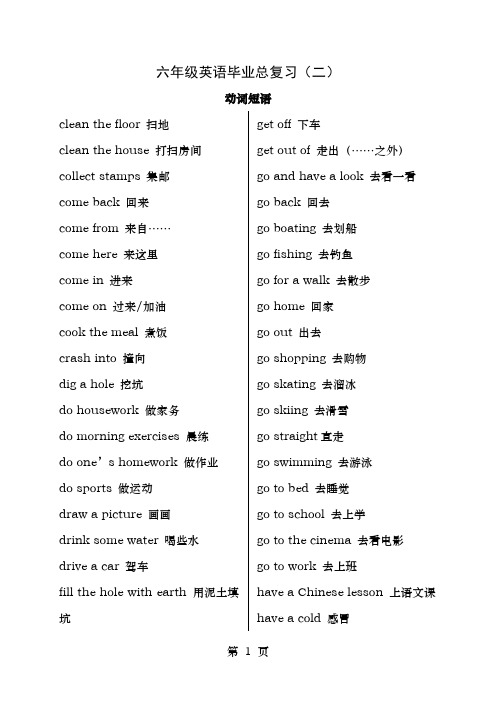
六年级英语毕业总复习(二)动词短语clean the floor 扫地clean the house 打扫房间collect stamps 集邮come back 回来come from 来自……come here 来这里come in 进来come on 过来/加油cook the meal 煮饭crash into 撞向dig a hole 挖坑do housework 做家务do morning exercises 晨练do one’s homework 做作业do sports 做运动draw a picture 画画drink some water 喝些水drive a car 驾车fill the hole with earth 用泥土填坑get off 下车get out of 走出(……之外)go and have a look 去看一看go back 回去go boating 去划船go fishing 去钓鱼go for a walk 去散步go home 回家go out 出去go shopping 去购物go skating 去溜冰go skiing 去滑雪go straight直走go swimming 去游泳go to bed 去睡觉go to school 去上学go to the cinema 去看电影go to work 去上班have a Chinese lesson 上语文课have a cold 感冒have a fever 发烧have a good time 玩得开心have a headache 头痛have a look 看一看have a picnic 举行野餐活动have a rest 休息have a stomachache 胃痛have a toothache 牙痛have a trip 去旅游have a try 试一试have breakfast 吃早餐have fun=have a good time玩得开心have lunch 吃午饭have supper/dinner 吃晚饭have time 有时间just a minute 等一下just now 刚才let me see 让我想一想/让我看一看listen to music 听音乐make friends 交朋友make the bed 整理床铺next to 下一个no problem 没问题paint a picture 涂画pick up 捡起plant trees 种树play basketball 打篮球play football 踢足球play games 玩游戏play the piano 弹钢琴put away 放好put on 穿上ride a bike 骑自行车take exercise 进行锻炼take medicine 服药take off 脱下take photos 照相turn off 关闭turn on 打开wait a moment 稍等一下wait for 等候wash clothes 洗衣服wash dishes 洗碟子watch a football match 看足球赛watch TV 看电视water the flower 浇花water the tree 浇树write a letter 写信介词短语a glass of 一杯……a lot of 许多……a map of 一幅……的地图a pair of 一双……a picture of 一幅……的画a plate of 一碟……agree with 同意……all of them 他们大家all of us 我们大家at first 首先at home 在家at last 最后at night 在晚上at school 在学校at the top of 在……顶部at the weekend 在周末be good at 擅长于……be made of 由……制造by the way 顺便问问close to 靠近……different from 不同于fall down 跌倒far away from 远离from…to…从……到……full of 充满get off 下车get on 上车get out of 走出……之外get to 到达go on 继续hand in 上交help…with…帮助某人做某事in English 用英语in front of 在……前面in the afternoon 在下午in the east / south / west /north在东/南/西/北方in the evening 在晚上in the middle 在中间in the morning 在早上in the sky 在空中in time 及时in trouble 遇到麻烦It’s time to do是该……的时候了。
- 1、下载文档前请自行甄别文档内容的完整性,平台不提供额外的编辑、内容补充、找答案等附加服务。
- 2、"仅部分预览"的文档,不可在线预览部分如存在完整性等问题,可反馈申请退款(可完整预览的文档不适用该条件!)。
- 3、如文档侵犯您的权益,请联系客服反馈,我们会尽快为您处理(人工客服工作时间:9:00-18:30)。
小学六年级英语毕业复习资料(一)时态一、一般现在时: 表示经常性、规律性习惯性的动作或现在存在的状态。
结构:1. 动作词一般用原形,但如果是第三人称单数时(如Tony ,he ,she ),动作词用第三人称单数形式,即加s 或es ;在主语前加do, does帮助疑问句,后面的动词用原形;在动作词前加don’t, doesn’t 帮助否定句,后面的动词用原形。
2. 句子中没动作词时,用be动词:is , am , are ;is , am , are 放在主语前帮助疑问句;is , am , are 后面加上not帮助否定句。
3. 情态动词can, may, should,must引起的句子是一般现在时,后面接动词用原形;can, may, should,must 放在主语前帮助疑问句,后面接动词用原形;can, may, should, must后面加上not帮助否定句,后面接动词用原形。
4. 肯定祈使:动词原形+ 其它否定祈使句:Don’t +动词原形+ 其它5.感叹句:What a mess! What a beautiful desert! What beautiful flowers! ——What+(形)名How beautiful! How beautiful the flower is! How beautiful the flowers are! ——How+形A. 肯定句:(非第三人称单数)主语+V+其它We come from China.(第三人称单数)主语+Vs+其它He comes from China.主语+be (is, am, are)+其它We are from China.主语+情态动词(can, may, should, must)+V+其它She must go.B. 否定句:(非第三人称单数)主语+don’t +V+其它We don’t come from China.(第三人称单数) 主语+doesn’t +V+其它He doesn’t come from China.主语+be (is, am, are) not+其它I aren’t from China.主语+情态动词(can, may, should, must)+not +V+其它C.一般疑问句:Do +(非第三人称单数)主语+V+其它Do you come from China?Does +(第三人称单数)主语+Vs+其它Does he come from China?be (Is, Am, Are)+主语+其它Are you from China?情态动词(Can, May, Should, Must)+主语+ V+其它She can’t go.D.特殊疑问句:特殊疑问词+do +(非第三人称单数)主语+V+其它Where do you come from?特殊疑问词+does +(第三人称单数)主语+Vs+其它Where does he come from?特殊疑问词+be (is, am, are)+主语+其它Where are you from?特殊疑问词+情态动词(Can, May, Should, Must)+主语+ V+其它Can she go?二、现在进行时:表示现在正在进行的动作。
结构:1. be动词( is , am , are) + 动词ing (现在分词);is , am , are 放在主语前帮助疑问句,后面的动词加ing;is , am , are 后面加上not帮助否定句,后面的动词加ing。
A. 肯定句:主语+be(is, am, are)+Ving+其它They are coming here.B. 否定句:主语+be(is, am, are)+not +Ving+其它They aren’t coming here.C. 一般疑问句:be(Is, Am, Are)+主语+ Ving+其它Are they coming here?D. 特殊疑问句:特殊疑问词+ be(is, am, are)+主语+ Ving+其它What are they doing?三、一般过去时:表示过去某个时间里发生了的动作或状态。
结构:1. 动作词用过去式(ed ) ;在主语前加did帮助疑问句,后面的动词用原形;在动作词前加didn’t帮助否定句,后面的动词用原形。
2. 句子中没动作词时,用be动词的过去式:was , were;was , were 放在主语前帮助疑问句;was , were后面加上not帮助否定句。
A. 肯定句:主语+Ved+其它We came from China主语+be (was, were)+其它We were from China.B. 否定句:主语+didn’t +V +其它We didn’t come from China.主语+be (was, were) +not+其它We weren’t from China.C.一般疑问句:Did +主语+V +其它Did you come from China?be (Was, Were)+主语+其它Were you from China?D.特殊疑问句:特殊疑问词+ did +主语+V +其它Where did you from?特殊疑问词+ be (was, were)+主语+其它Where were from?四、一般将来时:表示将来某个时间的动作或状态。
结构:1. be going to + 动词原形is , am , are 放在主语前帮助疑问句;is , am , are 后面加上not帮助否定句。
2. will+ 动词原形will放在主语前帮助疑问句,后面接动词用原形;will后面加上not帮助否定句,后面接动词用原形。
A. 肯定句:主语+will +V +其它He will dig a hole.主语+ be going to +V +其它He is going to dig a hole.B. 否定句:主语+will not +V +其它He won’t dig a hole.主语+ be not going go +V +其它He isn’t going to dig a hole.C.一般疑问句:Will+主语+V+其它Will he dig a hole?Be(Is, Am, Are) +主语going to +V+其它Is he going to did a hole?D.特殊疑问句:特殊疑问词+will+主语+V+其它What will he do?特殊疑问词+be(is, am, are) +主语going to +V+其它What is he going to do?五、过去进行时:表示过去某时正在进行的动作。
结构:1. be动词( was, were) + 动词ing;was, were 放在主语前帮助疑问句,后面的动词加ing;was, were后面加上not帮助否定句,后面的动词加ing。
A. 肯定句:主语+be(was, were)+Ving He was digging a hole.B. 否定句:主语+be(was, were)+not +Ving He wasn’t digging a hole.C. 一般疑问句:be(Was, Were)+主语+ Ving Was he digging a hole?D. 特殊疑问句:特殊疑问词+ be(was, were)+主语+ Ving What was he doing(二)时态意义与结构一览表:(三)句子的分类1. 陈述句A.肯定陈述句:①主语+be+其它+句号②主语+V(Vs, Ved)+其它+句号③主语+情态动词+V+其它+句号B.否定陈述句:①主语+be not +其它+句号②主语+don’t(doesn’t, didn’t)+V+其它+句号③主语+情态动词+not+V+其它+句号2. 疑问句A.一般疑问句:①be+主语+其它+问号②Do(Does,Did)+主语+V+其它+问号③情态动词+主语+V+其它+问号B.特殊疑问句:①特殊疑问词+be+主语+其它+问号②特殊疑问词+do(does,did)+主语+V+其它+问号③特殊疑问词+情态动词+主语+V+其它+问号3.祈使句A.肯定祈使句:动词(原形)+其他+标点B.否定祈使句:Don’t+动词(原形)+其他+标点4.感叹句:What a mess! What a beautiful desert! What beautiful flowers! —What+(形)名How beautiful! How beautiful the flower is! How beautiful the flowers are! —How+形(五)描写天气的句型A. There be+名词,There will be+名词。
(名词:snow, wind, rain, cloud, sun)如:There is rain. There was rain. There will be rain.B. It be+形容词,It will be+形容词。
(形容词:snowy, windy, rainy, cloudy, sunny, hot,, cold, warm, cool, fine)如:It is rainy. It was rainy. It will be rainy.C. It +Vs或Ved,It+be +Ving It+ will +V。
(名词:snow, wind, rain)如:It rains. It rained. It is raining. It will rain.(六)形容词比较级和最高级一.形容词比较级:1. 指两个人或物相对比。
2. 标志词:than3. much 用来修饰形容词比较级,放在比较级前面。
4. 事物之间的比较用What, Which; 人物之间比较用Who如:He is taller than me. He is much taller than me. She is much more beautiful than me.二.形容词最高级:1. 指三个或三个以上的人或物作对比 2. 标志词:in, of3. 最高级前面一般加定冠词the如:He is the tallest of the three. He is the tallest in our class.(七)缩写与分写1.(not缩写成---n’t或---’t )isn’t =is not aren’t=are not don’t=do not doesn’t=does not didn’t=did notwasn’t=was not weren’t=were not mustn’t=must not shouldn’t=should not can’t=can not2. (is缩写成---’s)he’s=he is she’s=she is it’s=it is name’s=name is that’s=that iswhat’s=what is who’s=who is where’s=where is how’s=how is Tony’s=Tony is3. (are缩写成---’re)they’re=they are we’re=we are you’re=you are there’re=there arewho’re=who are what’re=what are where’re=where are4 . 其它I’m =I am Let’s =Let us won’t=will not注:月份与星期缩写形式用单词前面三个字母。
